#scala radio
Text
Came across this
142 notes
·
View notes
Video
undefined
tumblr

#richard armitage#william farrow#obsession#netflix#josephine hart#morgan lloyd malcolm#gaumont uk#moonage pictures#scala radio#new interview#interview#post#tweet#twitter#news
55 notes
·
View notes
Text
"This week's #AlbumOfTheWeek is the 2021 London Cast Recording of the hit musical CABARET AT THE KIT KAT CLUB.
As well as playing tracks from the album across the week, here's Eddie talking about why he feels it's one of the most successful shows of all time!
🎥 Source: Scala Radio UK on Twitter
#Eddie Redmayne#eddieredmayne#redmayne#cabaret 2021#cabaret at the kit kat club#the emcee#scala radio#january 2023#cabaret cast album
10 notes
·
View notes
Text

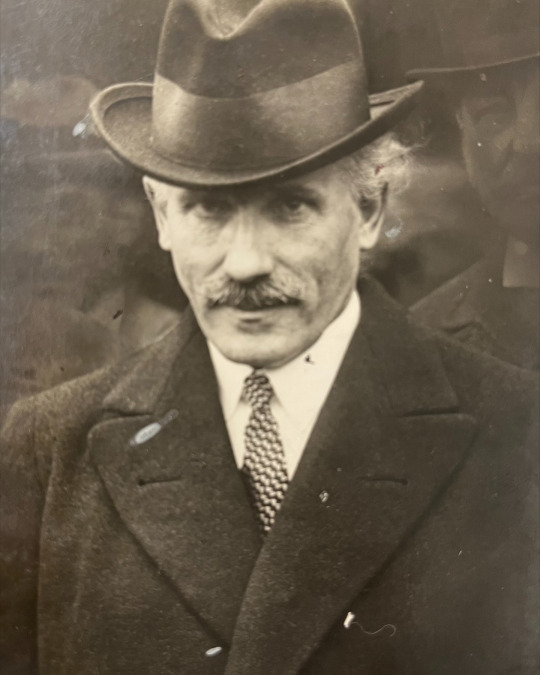
OTD in Music History: Legendary conductor Arturo Toscanini (1867 - 1957) dies in New York.
Toscanini was one of the most acclaimed and influential "classical" musicians of the late 19th and early 20th century -- revered for his intensity, for his perfectionism, for his incredible ear for orchestral detail and sonority, and for his eidetic memory.
At various points in his career, Toscanini served as the Director of La Scala in Milan, the New York Philharmonic, and the NBC Symphony Orchestra. It was this final position, however, that truly made him a household name (especially in the United States) through his radio and television broadcasts and many recordings of the operatic and symphonic repertoire.
During his own lifetime, Toscanini enjoyed a degree of public and critical adulation that is virtually unparalleled in the history of music: He was featured no less than *three* times on the cover of "Time" magazine (in 1926, 1934, and 1948), and for most of his career he enjoyed universally glowing reviews and played to consistently packed houses.
History always moves in cycles, however, and thus in recent decades it should come as no surprise that Toscanini has come in for growing criticism on a number of fronts -- most notably, for his alleged antipathy toward most 20th-century music (it is certainly truly that he rarely programmed "modern" works), for what some perceive as a certain rigidity in his beat and a regrettable tendency towards fast tempos, and (on a more personal level) for his well-known temper -- a temper which he was more than happy to unleash on players who displeased him...
Nevertheless, notwithstanding all of the above, Toscanini's place in the pantheon of all-time-great conductors remains just as secure in 2023 as it was back in 1923.
PICTURED: A c. 1920 real photo postcard showing the dapper middle-aged Toscanini staring intensely into the camera.
#Arturo Toscanini#Toscanini#conductor#Conducting#La Scala#Teatro alla Scala#New York Philharmonic#Symphony Orchestra#Symphony#Orchestra#Radio#Philharmonic Orchestra#Victor Talking Machine Company#Metropolitan Opera#Met#Metropolitan Opera House#the Metropolitan Opera#the Metropolitan Opera House#the Met#Carnegie Hall#Classical Music#Opera#Bel Canto#Music History#Rehearsal#broadcast#Recording#Concerto#Concert#photography
15 notes
·
View notes
Text

Music for the Royal Fireworks
1. Ramm 4
2. Links 2-3-4
3. Keine Lust
4. Sehnsucht
5. Asche zu Asche
6. Mein Herz brennt
7. Puppe
8. Wiener Blut
9. Zeit
10. Deutschland (RMX by Richard Z. Kruspe)
11. Deutschland
12. Radio
13. Mein Teil
14. Du hast
15. Sonne
16. Engel
Scala & Kolacny Brothers version avec Abélard (B-Stage)
17. Ausländer
18. Du riechst so gut
19. Pussy
20. Rammstein
21. Ich will
22. Adieu
Sonne Piano Version
Haifisch
Haiswing RMX by Olsen Involtini
#setlist 2024#rammstein#rammsteun 2024#europe stadium tour 2024#till lindemann#flake lorenz#paul landers#christoph schneider#richard kruspe#oliver riedel
60 notes
·
View notes
Text
Varie ed eventuali
Alla fresca età di [colpo di tosse] anni ho comprato il mio primo paio di anfibi. Neanche dieci giorni dopo mi son messo ad ascoltare i Rancid. La riflessologia plantare punk è una branca che andrebbe approfondita.
In questo periodo storico se il tuo peso forma coincide con le ultime due cifre del tuo anno di nascita o sei di mezza età o vai alle elementari
Ho una pila di libri arretrati che non sfiora il soffitto solo perché metà sono in formato digitale, e ho stimato che circa ogni quindici pagine lette mi viene in mente un altro libro che vorrei leggere. Ormai ho accettato serenamente di vivere annegato nei backlog, che siano di lettura, di lavatrici, di lavoro d'ufficio o di bestemmie arretrate
Arrivo dopo la puzza ma questo sbarbo oltre ad essere particolarmente talentuoso ha dato una rappresentazione di un certo tipo di disagio mentale incredibile: https://www.youtube.com/watch?v=s_nc1IVoMxc
Io e l'attualità non ci parliamo più da un pochino. Nell'ultimo tentativo di accensione di un tg a cinni presenti il piccolo ha visto un paio di palazzi ucraini distrutti e ha avuto paranoie belliche serali per una quindicina di giorni. L'altro giorno ho fatto un tentativo sintonizzandomi alle setteetrenta sul gr di popolare network trasmesso da radio città fujiko. Appena ha iniziato a sfumare Black Market dei Weather Report mi hanno iniziato a parlare in contemporanea in tre. Ho spento.
Negli ultimi due mesi il quantitativo di genitori di amici malati o deceduti è fuori scala, ma pure quello di amici che hanno scoperto sfighe di salute di vario tipo. Non sono pronto a tutto questo.
In una sfilza di attacchi di mal di testa che mi ha fatto inimicare a suon di porconi tutte le Principali Religioni Monoteistiche™, guardando il file dove da un paio d'anni ho iniziato ad appuntarmi questi eventi (i mal di testa, non le bestemmie) ho realizzato che novembre è sempre stato particolarmente infame come mese. Come se non avessi già abbastanza motivi per aborrire i mesi freddi.
Mi sono incammellato a guardare un quantitativo imbarazzante di versioni di White Rabbit. Amanda Palmer ne ha fatta una abbastanza strepitosa ma forse vincono questi tizi (non sai di avere bisogno di bluegrass lisergico finché non ti ci imbatti): https://www.youtube.com/watch?v=LeHlvXvG6vA (sul finale lo stregatto decolla)
Sono da sempre stato abbastanza utopista/idealista anche contro ogni evidenza (che credo sia una sorta di prerequisito per essere di sinistra) ma devo dire che il sol dell'avvenire non lo vedo più, manco come ombra diafana dietro al nebbione.
Poi qualcuno dirà frasi ad effetto tipo la notte è sempre più buia prima dell'alba ma quelle son cose tipo pestare una cacca porta fortuna, l'ha inventata uno che ne aveva appena pestata una per non menare qualcuno.
Se la situazione è una merda non è che puoi dirle che è bruttina, poi si fa delle illusioni (semi-cit).
40 notes
·
View notes
Text
little Scala ad Caelum headcanon that there's a whole archive of recordings (vinyls maybe? idk Scala seems to have radios) that were made by Ephemera recounting like. stories about Daybreak Town or just keyblade stuff in general. I like to imagine Luxu comes to Scala at some point while Ephemera is older and there are some recordings of him as well in whatever vessel he has at that moment (probably Brain, I like the idea of him showing up to see Eph as him aha,) and then later on after Ephemera has passed I think Luxu would take some of the recordings for himself so some of that history is technically lost now lmfao :^)
additional headcanon from @luxusdollhouse bc Bug was the one who started this, recordings of Ephemera and Luxu singing traditional songs and telling stories. ofc Luxu has stolen these too
#irt Luxu vessel; he would tell Eph he's Luxu and not Brain#I have written some stuff about that but have never posted it I should finish that stuff#anyway. this headcanon man#khux#luxu#ephemera#ephemer#headcanons#im rambling#khdr#kingdom hearts#bug and matt revelations
22 notes
·
View notes
Text
opera stream alert!

what: l'elisir d'amore, teatro alla scala 2015
when: tomorrow, sunday april 21, 1pm edt (utc -4)
where: https://kosmi.to/246t72
more info: what the hell is going on? why is it in an actual working airport? why do two random guys keep interrupting the show to talk about it like it's sports radio? come out and join, to find out more (hope you understand italian or french though)
#sasha speaks#opera tag#opera stream#elisir d'amore#l'elisir d'amore#elixir of love#the elixir of love#donizetti#gaetano donizetti#*the opera will have english subtitles. the commentators do not. for some reason#even though theyre speaking two different languages. for no clear reason#anyway#this one baffles me let's watch it
14 notes
·
View notes
Text
shuufey replied to your post "So, it is now three days into Pride, and the...”
In episode 100 of the Desolation Radio podcast, Michael says he spent some time at La Scala in the 80s.
Oh my GOD, thank you so much for this! Amazing. So first of all, here's the link for anyone who wants to listen to the podcast (and the relevant bit starts at the 1:14:00 mark).
But...wow. I had wondered if there was any possibility that Michael had gone to La Scala in the '80s, because he was a teenager (though he did turn 20 in 1989), and if that could be how he developed the head canon for Aziraphale and Crowley. There is still a world of difference, however, between going to see De Niro films (as Michael mentions in the podcast) and going to the "all nighters" (a.k.a., all-night gay film marathons/orgies). And we could still say that Michael just knew about the all-nighters by reputation/hearing about them from others, but now that we know Michael actually went to La Scala, it does not seem at all a far leap to think he went to those all-nighters.
And perhaps he only hoped for a boyfriend as beautiful as David to share those nights with--someone special, someone whose eyes he could look into--and so what a lovely thought to imagine that Michael's dream might have finally come true all these years later...
#shuufey#reply post#michael sheen#welsh seduction machine#at this point i hope anyone who still thinks Michael is straight#can just disabuse themselves of that notion#because dear god#i think Michael has been telling us exactly who he is for a long time now#bless his bisexual welsh chaos#amazing#discourse
33 notes
·
View notes
Text
Ora le scrivo
anzi no che poi la disturbo
anzi sì che c'è di male
le dico solo che la penso,
ehi ciao passavo per il tuo numero
e niente mi sei venuta in mente per sempre
no no, macchè per sempre oh
cancella subito
cancella tutto
le scrivo solo ti penso
ciao, ti penso,
no no, non funziona così
troppo vago
e poi che è ti penso? cioè che vuol dire?
ti penso come? la pensi bella? la pensi bene?
Oppure la pensi a fare la spesa mentre impreca perché è finita la carta forno
e lei stasera magari
voleva fare i peperoni gratinati?
No niente, cancella
così è troppo dolce e poco poetico
ciao scusa ti penso tolgo il disturbo ciao,
non va bene, ma che è?
cioè idee zero, ma come ragiono
patetico
sono uno stupido
ho trovato
le scrivo che la penso più del dovuto,
eh vabbeh mica posso scriverle già ste cose,
però mi manca,
le scrivo: mi manchi cento
ok, ma su che scala?
e se lei è una che parte a conteggiare
dal cento al mille?
cioè sarebbe come se le dicessi che non la penso quasi mai
meglio non rischiare
magari le scrivo
una cosa simpatica,
e ma la conosco poco
che ne so io che cosa è simpatico per lei
cioè il mio umorismo potrebbe essere diverso dal suo
magari il balck humor la offende
e magari ride a crepapelle con zelig
meglio non rischiare
ecco, le linko una canzone
e le dico, ciao è passata in radio e mi sei venuta in mente tu
però poi magari dice ma dai anche io stavo ascoltando la radio, che radio è che la metto?
o magari i suoi gusti musicali son diversi
ecco potrei dirle questo
ciao sei più verso i violini o verso i bassi?
più chitarra classica o più tuz tuz e cose nel bicchiere?
no, macché cose nel bicchiere ma che dico
idiota sono un idiota
dai non le scrivo niente
anzi le scrivo una cosa a caso tipo
"le sirene sono esistite davvero"
e poi le dico che ho sbagliato numero
scusa se ti ho disturbato
ho un amico che si chiama come te in rubrica
mi sono confuso, perdonami, come stai?
ti va di sposarci una di queste ore?
ma che dico ma smettila ma che è?
imbecille
ecco, sono queste
tutte le parole che ho cancellato
prima di scriverti semplicemente
ti ho pensato... ♠️🔥

G.Evan
8 notes
·
View notes
Text
The great conductor Arturo Toscanini passed away 66 years ago today in New York, where he has conducted over 550 performances since 1908. A rarity which he brought to The Metropolitan Opera was the opera "Germania" by Alberto Franchetti. This work was premiered at La Scala in Milan in 1902 and he conducted it for the US premiere in 1908, also with Enrico Caruso in a main role.
Here we see the original evening list from the performance at the MET and an original photo with Toscanini talking to musicians.


Here we see a castlist from one of the first performances he conduct at the The Metropolitan Opera. This was the 200. Carmen that was performed at the MET.

#Arturo Toscanini#Toscanini#conductor#Conducting#La Scala#Teatro alla Scala#New York Philharmonic#Symphony Orchestra#Symphony#Orchestra#Radio#Philharmonic Orchestra#Victor Talking Machine Company#Metropolitan Opera#Met#Metropolitan Opera House#the Metropolitan Opera#the Metropolitan Opera House#the Met#Carnegie Hall#Classical Music#Opera#Bel Canto#Music History#Rehearsal#broadcast#Recording#Concerto#Concert#Germania
2 notes
·
View notes
Text

1. Rammlied
2. Links 2-3-4
3. Bestrafe Mich
4. Giftig
5. Sehnsucht
6. Mein Herz Brennt
7. Puppe
8. Zeit
9. Deutschland (RMX by Richard Z. Kruspe)
10. Deutschland
11. Radio
12. Mein Teil
13. Du Hast
14. Sonne
15. Ohne dich (piano version avec Abélard)
16. Engel (Scala & Kolacny Brothers version avec Abélard)
17. Ausländer
18. Du Riechst So Gut
19. Pussy
20. Rammstein
21. Ich Will
22. Adieu
Sonne (audio piano version)
Haifisch (audio Haiswing RMX by Olsen Involtini)
Source : Rammstein World
#tw spoilers#rammstein#rammstein 2023#till lindemann#flake lorenz#paul landers#christoph schneider#oliver riedel#richard kruspe#europe stadium tour 2023#setlist
53 notes
·
View notes
Text
Il tempo ha molte facce diverse e l’orologio raramente segna quello che passa dentro di noi, il tempo reale della vita, d’altronde molti giorni possono passare in poche ore, e viceversa, e il numero di anni è una scala imprecisa per misurare la vita di un uomo, chi muore prima di quarant’anni forse ha vissuto in realtà molto di più di chi muore oltre gli ottanta.
Jòn Kalman Stefànsson - Paradiso e Inferno
Ph Rodney Smith
6 notes
·
View notes
Text
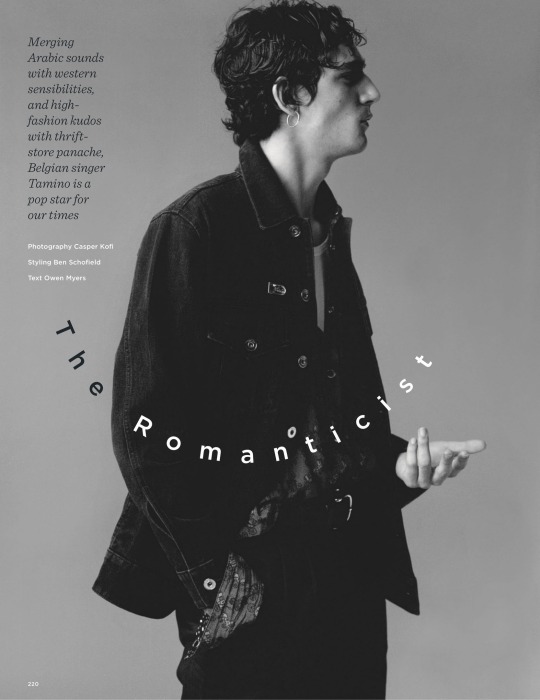

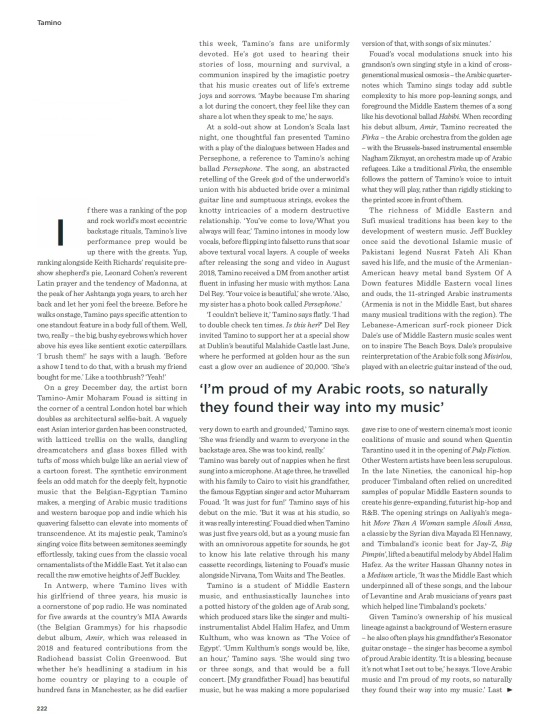
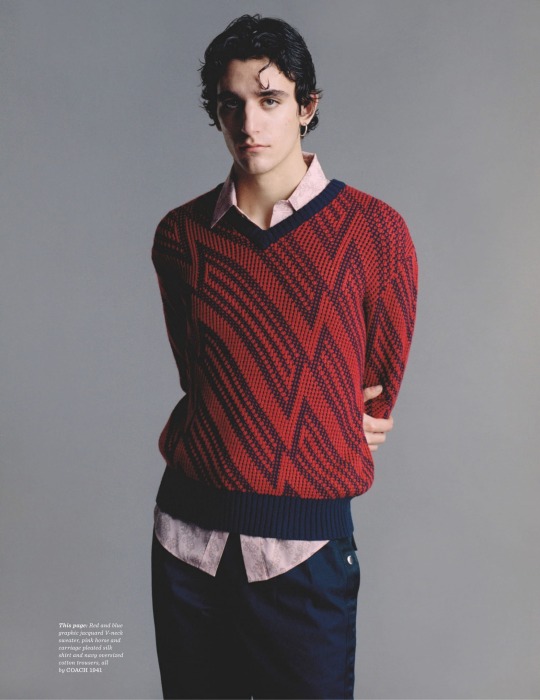
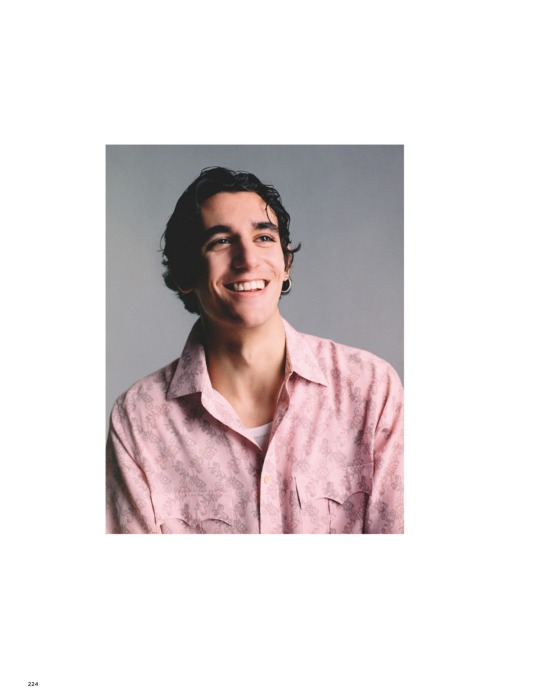



— Tamino for British GQ Style, Issue 30 / Spring/Summer 2020 (x)
The Romanticist
Merging Arabic sounds with western sensibilities, and high-fashion kudos with thrift-store panache, Belgian singer Tamino is a pop star for our times
Photography Casper Kofi
Styling Ben Schofield
Text Owen Myers
12 July 2020
If there was a ranking of the pop and rock world’s most eccentric backstage rituals, Tamino’s live performance prep would be up there with the greats. Yup ranking alongside Keith Richards’ requisite pre- show shepherd’s pie, Leonard Cohen’s reverent Latin prayer and the tendency of Madonna, at the peak of her Ashtanga yoga years, to arch her back and let her yoni feel the breeze. Before he walks onstage, Tamino pays specific attention to one standout feature in a body full of them. Well, two, really – the big, bushy eyebrows which hover above his eyes like sentient exotic caterpillars. ‘I brush them!’ he says with a laugh. ‘Before a show I tend to do that, with a brush my friend bought for me.’ Like a toothbrush? ‘Yeah!’
On a grey December day, the artist born Tamino-Amir Moharam Fouad is sitting in the corner of a central London hotel bar which doubles as architectural selfie-bait. A vaguely east Asian interior garden has been constructed, with latticed trellis on the walls, dangling dreamcatchers and glass boxes filled with tufts of moss which bulge like an aerial view of a cartoon forest. The synthetic environment feels an odd match for the deeply felt, hypnotic music that the Belgian-Egyptian Tamino makes, a merging of Arabic music traditions and western baroque pop and indie which his quavering falsetto can elevate into moments of transcendence. At its majestic peak, Tamino’s singing voice flits between semitones seemingly effortlessly, taking cues from the classic vocal ornamentalists of the Middle East. Yet it also can recall the raw emotive heights of Jeff Buckley.
In Antwerp, where Tamino lives with his girlfriend of three years, his music is a cornerstone of pop radio. He was nominated for five awards at the country’s MIA Awards (the Belgian Grammys) for his rhapsodic debut album, Amir, which was released in 2018 and featured contributions from the Radiohead bassist Colin Greenwood. But whether he’s headlining a stadium in his home country or playing to a couple of hundred fans in Manchester, as he did earlier this week, Tamino’s fans are uniformly devoted. He’s got used to hearing their stories of loss, mourning and survival, a communion inspired by the imagistic poetry that his music creates out of life’s extreme joys and sorrows. ‘Maybe because I’m sharing a lot during the concert, they feel like they can share a lot when they speak to me,’ he says.
At a sold-out show at London’s Scala last night, one thoughtful fan presented Tamino with a play of the dialogues between Hades and Persephone, a reference to Tamino’s aching ballad Persephone. The song, an abstracted retelling of the Greek god of the underworld’s union with his abducted bride over a minimal guitar line and sumptuous strings, evokes the knotty intricacies of a modern destructive relationship. ‘You’ve come to love/What you always will fear,’ Tamino intones in moody low vocals, before flipping into falsetto runs that soar above textural vocal layers. A couple of weeks after releasing the song and video in August 2018, Tamino received a DM from another artist fluent in infusing her music with mythos: Lana Del Rey. ‘Your voice is beautiful,’ she wrote. ‘Also, my sister has a photo book called Persephone.’
‘I couldn’t believe it,’ Tamino says flatly. ‘I had to double check ten times. Is this her?’ Del Rey invited Tamino to support her at a special show at Dublin’s beautiful Malahide Castle last June, where he performed at golden hour as the sun cast a glow over an audience of 20,000. ‘She’s very down to earth and grounded,’ Tamino says. ‘She was friendly and warm to everyone in the backstage area. She was too kind, really.’ Tamino was barely out of nappies when he first sung into a microphone. At age three, he travelled with his family to Cairo to visit his grandfather, the famous Egyptian singer and actor Muharram Fouad. ‘It was just for fun!’ Tamino says of his debut on the mic. ‘But it was at his studio, so it was really interesting.’ Fouad died when Tamino was just five years old, but as a young music fan with an omnivorous appetite for sounds, he got to know his late relative through his many cassette recordings, listening to Fouad’s music alongside Nirvana, Tom Waits and The Beatles.
Tamino is a student of Middle Eastern music, and enthusiastically launches into a potted history of the golden age of Arab song, which produced stars like the singer and multi- instrumentalist Abdel Halim Hafez, and Umm Kulthum, who was known as ‘The Voice of Egypt’. ‘Umm Kulthum’s songs would be, like, an hour,’ Tamino says. ‘She would sing two or three songs, and that would be a full concert. [My grandfather Fouad] has beautiful music, but he was making a more popularised version of that, with songs of six minutes.’ Fouad’svocal modulations snuck into his grandson’s own singing style in a kind of cross- generational musical osmosis – the Arabic quarter- notes which Tamino sings today add subtle complexity to his more pop-leaning songs, and foreground the Middle Eastern themes of a song like his devotional ballad Habibi. When recording his debut album, Amir, Tamino recreated the Firka – the Arabic orchestra from the golden age – with the Brussels-based instrumental ensemble Nagham Zikrayat, an orchestra made up of Arabic refugees. Like a traditional Firka, the ensemble follows the pattern of Tamino’s voice to intuit what they will play, rather than rigidly sticking to the printed score in front of them.
The richness of Middle Eastern and Sufi musical traditions has been key to the development of western music. Jeff Buckley once said the devotional Islamic music of Pakistani legend Nusrat Fateh Ali Khan saved his life, and the music of the Armenian- American heavy metal band System Of A Down features Middle Eastern vocal lines and ouds, the 11-stringed Arabic instruments (Armenia is not in the Middle East, but shares many musical traditions with the region). The Lebanese-American surf-rock pioneer Dick Dale’s use of Middle Eastern music scales went on to inspire The Beach Boys. Dale’s propulsive reinterpretation of the Arabic folk song Misirlou, played with an electric guitar instead of the oud, gave rise to one of western cinema’s most iconic coalitions of music and sound when Quentin Tarantino used it in the opening of Pulp Fiction. Other Western artists have been less scrupulous. In the late Nineties, the canonical hip-hop producer Timbaland often relied on uncredited samples of popular Middle Eastern sounds to create his genre-expanding, futurist hip-hop and R&B. The opening strings on Aaliyah’s mega- hit More Than A Woman sample Alouli Ansa , a classic by the Syrian diva Mayada El Hennawy, and Timbaland’s iconic beat for Jay-Z, Big Pimpin’, lifted a beautiful melody by Abdel Halim Hafez. As the writer Hassan Ghanny notes in a Medium article, ‘It was the Middle East which underpinned all of these songs, and the labour of Levantine and Arab musicians of years past which helped line Timbaland’s pockets.’
Given Tamino’s ownership of his musical lineage against a background of Western erasure – he also often plays his grandfather’s Resonator guitar onstage – the singer has become a symbol of proud Arabic identity. ‘It is a blessing, because it’s not what I set out to be,’ he says. ‘I love Arabic music and I’m proud of my roots, so naturally they found their way into my music.’ Last year he played concerts in Morocco, Tunisia and Turkey, and he’s aiming to play in Lebanon this year; he tells me that I ‘have to’ visit Beirut, one of his favourite cities.
Even so, the western media’s focus on his identity has given Tamino pause. ‘I wonder whether it’s a good or a bad thing,’ he says, suddenly pensive. ‘Maybe it’s not that good if it becomes the only focus. It can be used in a different way, which is kind of as the antidote to all the bad news we’re hearing of [Arab] regions. And then using that as, “Look, this is some good news!” I don’t want that to be the only reason why I’m invited on certain platforms. I don’t want people to go, “I don’t really like his music, but it’s important’” – he grimaces – “it’s important to show it.’” There’s something patronising about the idea that he would be used as to fulfil a diversity quota. ‘It’s true,’ he says emphatically. ‘Absolutely.’
As he sits in the bar, sipping bottled water as blissy house music plays, Tamino’s hair falls in perfectly unkempt Timothée Chalamet waves. He wears a plain black T-shirt with high-waisted dark grey Ann Demeulemeester trousers, which seem to be made from some kind of treated wool. I ask to touch the fabric, and they may be the softest trousers I have ever felt: the Platonic ideal of sunday-afternoon dressing. ‘It’s really good fabric,’ he says. ‘I love the flowyness.’
Tamino’s relationship with Ann Demeulemeester started back in 2017, when he was starting to get booked for European festivals on the back of his enchanting early singles Habibi and Cigar .Tamino’s thrift-store togs had worked fine for his early performances on BBC Radio 1 and for talent contests in Belgium (he won radio station Studio Brussel’s 2017 talent competition), but he decided that they wouldn’t cut it on bigger stages. ‘I didn’t want to have the stress of like, “Ahhh, I don’t have anything to wear for this important concert,’” he says. ‘That’s when we approached them.’
A six-foot 19-year old with a jawline that could slice butter? Demeulemeester promptly kitted Tamino out in their autumn/winter line. Helping grease the wheels was the fact that Tamino’smum is friends with a few of the female designers at the label – and they’ve known the singer since he was a child. ‘The head designer, Sébastien [Meunier] is really good,’ Tamino says. ‘I think what they’re doing is so cool. Ann has left the company but I think they’re continuing her legacy in such a beautiful way.’
What does he like about Demeulemeester’s clothes? He pauses for a moment, furrowing those hedge-like eyebrows. ‘I can only say that when I wear the clothes I feel fully like myself,’ he says. ‘I find it really important just to go about my day really feeling at ease, and definitely when I’m on stage. I’ve felt it before when I’ve gone on stage and I wasn’t really feeling what I was wearing. I didn’t like it.’
The wider fashion world has been quick to follow. Tamino starred in the Missoni menswear SS19 campaign (Gisele was his womenswear counterpart) and spent his 21st birthday shooting in New York with photographer Harley Weir. ‘I don’t have ambitions in [modelling],’ he says. ‘But the things that have happened naturally in the fashion world, I do appreciate them. I love to go to fashion shows. I go to Ann, and Yohji Yamamoto as well. That’s also one of my favourites. It’s crazy – you’re wearing art.’
Yet Tamino’s most memorable look came from wearing hardly anything at all. In the video for his 2018 single Tummy, he appears as a nearly nude pharaoh swarmed by followers, wearing a chest plate and liquid eye make-up styled like the Eye of Horus, the Ancient Egyptian symbol of royalty and protection. Oh, and he’s covered in gold body paint which took 90 minutes to apply to every crease and crevice of his skin. He looks like a cross between Rameses II, a living-statue busker, and a Quality Street wrapper. ‘I find it a very funny image,’ he says. ‘When you talk about Egypt, it’s logical that people [think of] ancient images – the Pyramids, the pharaohs. Of course, that’s not what Egypt is today.’ The aim of the video was, in part, to poke fun at lazy stereotypes of Egyptian culture.
Amidst Tummy’s figurative lyrics of bugs, angels and ‘flying in the sky like cupid’, the song is also unapologetically about sex, which is appropriate given that, in the video, his bare flesh is smothered by anonymous hands in a kind of orgiastic ecstasy. ‘It’s referring to the return to the animalistic when you’re involved in a sexual act,’ he says, with a shy smile creeping onto his face. Sounds fun! ‘Yeah, it is,’ he says, before laughing. ‘You lose all your pride, all your dignity in a way, because you’re not really controlling human consciousness.’
Yet beyond bodily pleasures, the song taps into feelings of inadequacy that might be relatable for any listener who’s felt undeserving of their partner or like an imposter at work. ‘It’s like you must [...]/ Have a lust/For making something of me,’ he sings as orchestration swells. ‘Sometimes you feel like you’re not worth certain gifts you’ve been given,’ he says. ‘And that could be anything, you know?’ It’s a startlingly humble pronouncement from a star on the rise, an admission of self-doubt that is bred out of most musicians in media training and cautioned against by coddling publicists. How often does that feeling rear its head? ‘It’s not ever gone and it’s not always present,’ he says.
Tamino’s struggles are expressed even more plainly in the ominous ballad Indigo Night , where rippling strings evoke the turmoil of a mind that won’t quieten. In a music video inspired by the mind-bending surrealism of Egypt’s 1940s Art et Liberté movement, he sings with desperation: ‘Why can’t I sing along with some feeling, or some meaning?/It feels like I’ve always been blind.’ He wrote the song in a period of personal upheaval, when he moved from the quiet city of Antwerp to the relative bustle of Amsterdam, at the age of 17, to study at Amsterdam Royal Conservatory, one of Europe’s most prestigious musical colleges.
‘For me it’s a song about awakening,’ he says. ‘I had moved, and for me it was a big, big step. I was not at ease and feeling a bit apathetic. A bit indifferent to everything that was happening.’ He’s since learned coping mechanisms for low points. Meditation is helping him feel more at ease in his skin; he starts each day by listening to Waking Up , the mindfulness app from the neuroscientist and philosopher Sam Harris. And he often returns to his favourite book, the Lebanese- American philosopher Kahlil Gibran’s collection of prose-poems, The Prophet. ‘There’s one [passage] that’s been really important to me,’ he says. ‘It’s like that you show your love of life through work: “work is visible love”. I think that’s really beautiful.’
Before setting off on a US tour this spring, Tamino has a couple of months of downtime in Antwerp. He recently bought a house in a multicultural area of the city, where he lives with his girlfriend, and he’s continuing to study Arabic, with the help of the Duolingo app. ‘Every time I do something that brings me closer to this culture, I feel good,’ he says. ‘It feels like a reconnection.’ He’s also working on new music as well as continuing to learn the oud, which he’s been studying with the help of a Syrian teacher in Antwerp. ‘It’s actually the ancestor of the guitar,’ he notes of the oud. ‘It’s beautiful.’ It can feel today like international relationships between cultures are especially fractious, when politicians across the world run on campaigns to strengthen borders and put up walls. The cross-cultural conversation embedded in Tamino’s music may not solve the problems of an increasingly divided world, but it might offer a roadmap of how music can inspire honest and respectful cultural exchange. But that’s for Tamino’s audience and critics to decide. His own goals are rather more humble. ‘Fame is not an ambition of mine,’ he says. ‘But just to be able to do this, and play in venues all over the world, and meet people...’ he trails off, smiling. ‘I think it won’t get better than that.’
#tamino#tamino amir#gq style#article#interview#english#2020#with photoshoot#original text#you'll see everyone credit this photoshoot as 2019 though that's probably when it was actually posted#screenshots from vk#read via link
66 notes
·
View notes
Text

Ora le scrivo,
anzi no, che poi la disturbo.
Anzi sì, che c'è di male,
le dico solo che la penso:
"ehi ciao, passavo per il tuo numero
e niente, mi sei venuta in mente.... per sempre!"
No no, macchè per sempre.
Oh cancella subito, cancella tutto.
Le scrivo solo ti penso:
"ciao, ti penso!"
No no, non funziona così....troppo vago
e poi cos'è ti penso? cioè, che vuol dire?
ti penso come? la pensi bella? la pensi bene?
Oppure la pensi a fare la spesa mentre impreca perché è finita la carta, forse lei stasera magari voleva fare i peperoni gratinati?
No niente, cancella.
Così è troppo dolce e poco poetico:
"Ciao scusa, ti penso, tolgo il disturbo ciao!"
Non va bene, ma che è?
Cioè idee zero,
ma come ragiono?
patetico, sono uno stupido!
Ho trovato, le scrivo che la penso più del dovuto,
eh, vabbé, mica posso scriverle già 'ste cose,
però mi manca.
Le scrivo: "mi manchi cento!"
Ok, ma su che scala?
E se lei è una che parte a conteggiare dal cento al mille?
Cioè sarebbe come se le dicessi che non la penso quasi mai,
meglio non rischiare.
Magari le scrivo una cosa simpatica
e....ma la conosco poco,
che ne so io, che cosa è simpatico per lei,
cioè il mio umorismo potrebbe essere diverso dal suo,
magari il black humor la offende
e magari ride a crepapelle con Zelig,
meglio non rischiare.
Ecco, le linko una canzone
e le dico: "Ciao, è passata in radio e mi sei venuta in mente tu!"
Però poi magari dice: "Ma dai, anche io stavo ascoltando la radio, che radio è, che la metto?"
O magari i suoi gusti musicali son diversi.
Idiota, sono un idiota,
dai non le scrivo niente.
Anzi le scrivo una cosa a caso tipo:
"le sirene sono esistite davvero"
e poi le dico che ho sbagliato numero,
"scusa se ti ho disturbato,
ho un amico che si chiama come te in rubrica,
mi sono confuso, perdonami, come stai?
Ti va di sposarci una di queste ore?"
Ma che dico, ma smettila, ma che è?
Imbecille.
Ecco, sono queste tutte le parole che ho cancellato prima di scriverti semplicemente:
"ti ho pensato"
~ Gio Evan ~
2 notes
·
View notes
Text
Il caso non esiste: c’è una forza intelligente che governa il tutto.
"Fisico e teorico americano molto rispettato, Michio Kaku, famoso per la formulazione della teoria rivoluzionaria delle stringhe (modello di fisica fondamentale che presuppone che le particelle materiali apparentemente specifici sono in realtà “stati vibrazionali”) , ha recentemente causato una piccola scossa nella comunità scientifica sostenendo di aver trovato le prove dell’esistenza di una forza sconosciuta e intelligente che governa la natura.
Più semplicemente, secondo il noto fisico, qualcuno simile al concetto che molti hanno di Dio come creatore e organizzatore dell’universo.
Per arrivare a questa conclusione Michio Kaku ha utilizzato una nuova tecnologia creata nel 2005 e che gli ha permesso di analizzare il comportamento della materia su scala subatomica, basandosi su un “primitivo tachioni semi-radio”. Tachioni, incidentalmente, sono tutte quelle ipotetiche particelle in grado di muoversi a velocità superluminali, cioè sono particelle teoriche, prive di qualsiasi contatto con l’universo. Quindi questa materia è pura, totalmente libera dalle influenze dell’universo che la circonda.
Secondo il fisico, osservando il comportamento di questi tachioni in diversi esperimenti, si arriva alla conclusione che gli esseri umani vivono in una sorta di “Matrice”, cioè un mondo governato da leggi e principi concepiti da una specie di grande architetto intelligente. “Sono giunto alla conclusione che siamo in un mondo fatto da regole create da un’intelligenza, non molto diversa da un gioco per computer, ma naturalmente, più complessa”, ha detto lo scienziato. Analizzando il comportamento della materia a scala subatomica, colpiti dalle primitive tachioni semi-radio, un piccolo punto nello spazio per la prima volta nella storia, totalmente libero da ogni influenza dell’universo, la materia, la forza o la legge, è percepito il caos assoluto in forma inedita. “Credetemi, tutto quello che fino a oggi abbiamo chiamato caso, non ha alcun significato, per me è chiaro che siamo in un piano governato da regole create e non determinate dalle possibilità universali, Dio è un gran matematico” ha detto lo scienziato. Michio Kaku ha ricordato che “qualcuno fece ad Einstein la grande domanda: c’è un Dio? Al che Einstein rispose dicendo che credeva in un Dio rappresentato dall’ordine, dall’armonia,, dalla bellezza, dalla semplicità e dall’eleganza, il Dio di Spinoza. L’universo potrebbe essere caotico e brutto, invece è bello, semplice e governato da semplici regole matematiche.
” La teoria degli archi e la musica di Dio.
Per quanto riguarda la formulazione del famoso “String Campo Theory”, o teoria delle stringhe, modello fondamentale della fisica che presuppone che particelle di materiale apparentemente specifici sono effettivamente “stati vibrazionali” un oggetto esteso più base chiamato ” corda “o” filamento “che renderebbe un elettrone, per esempio, non un” punto “struttura interna e dimensione zero, ma una massa di minuscole corde vibranti in uno spazio-tempo di più di quattro dimensioni , Kaku ha affermato che “per lungo tempo ho lavorato su questa teoria, che si basa su musica o piccole corde vibranti che ci danno le particelle che vediamo in natura. Le leggi della chimica con cui abbiamo avuto problemi alle superiori, sarebbero le melodie che possono essere suonate su queste corde vibranti.
L’universo, sarebbe una sinfonia di queste corde vibranti e la mente di Dio, su cui Einstein scrisse molto, sarebbe la musica cosmica che risuona attraverso questo nirvana, attraverso uno spazio iper-dimensionale “. Il fisico americano di origine giapponese ha concluso che “i fisici sono gli unici scienziati che possono pronunciare la parola. “Dio” e non arrossire. Il fatto essenziale è che queste sono domande cosmiche di esistenza e significato. Thomas Huxley, il grande biologo del secolo scorso, ha affermato che la questione di tutte le questioni della scienza e della religione è determinare il nostro posto e il nostro vero ruolo nell’universo. Pertanto, scienza e religione trattano la stessa domanda. Tuttavia, c’è stato essenzialmente un divorzio nel secolo scorso, più o meno, tra scienza e umanesimo, e penso che sia molto triste che non parliamo più la stessa lingua “.
Febbraio 2018
Tradotto da Newstime24

5 notes
·
View notes